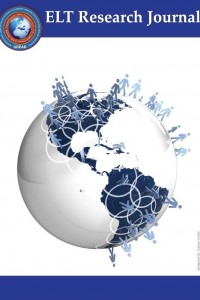Abstract
References
- Beretta, A. (1992). Evaluation of language education: An overview. Evaluating second language education, 5-24.
- Coşkun, A. (2013). An investigation of the effectiveness of the modular general English language teaching preparatory program at a Turkish university. South African Journal of Education, 33(3), 1-18.
- Hogan, R. L. (2007). The historical development of program evaluation: exploring the past and future. Online Journal of Workforce Education and Development, 2(4), 2-14.
- Karatas, H., & Fer, S. (2009). Evaluation of English curriculum at Yildiz Technical University using CIPP model. Egitim ve Bilim, 34(153), 47-60.
- Lynch, B. K. (1990). A context‐adaptive model for program evaluation. TESOL Quarterly, 24(1), 23-42.
- Mathews, T. J., & Hansen, C. M. (2004). Ongoing assessment of a university foreign language program. Foreign Language Annals, 37(4), 630-640.
- Mede, E. & Uygun, S. (2014). Evaluation of a language preparatory program: A case study. ELT Research Journal, 3(4), 201-221.
- Mirici, I. H., & Saka, F. O. (2004). Dissemination of A proposed English Preparatory Class Model for The Black Sea Region Countries Through Internet. Turkish Online Journal of Distance Education, 5(2), 33-39.
- Norris, J. M. (2009). Understanding and improving language education through program evaluation: Introduction to the special issue. Language Teaching Research, 13(1), 7-13.
- Özkanal, Ü., & Hakan, A. G. (2010). Effectiveness of university English preparatory programs: Eskisehir Osmangazi University foreign languages department English preparatory program. Journal of Language Teaching and Research, 1(3), 295-305.
- Wright, B. D. (2006). Learning languages and the language of learning. The Modern Language Journal, 90(4), 593-597.
Abstract
Program evaluation in language programs, just as with other programs, is
regarded as a vital process to make sure a language teaching course or a
specified supplementary program function in the desired nature. Especially,
language programs in Turkish context are in need of constant check since
countries similar to Turkey are required to follow language standards dictated
by the western world to be able to compete with their education levels; in
that, the Common European Framework for Reference sets a guideline for language
programs. However, it is evident that Turkish language teaching programs lack a
standard within their regional context and often fail to meet the expectations
of language teaching frameworks set by CEFR in terms of language proficiency.
In relation, several evaluation studies have been conducted to determine the
effectiveness of language programs run in Turkish universities. Therefore, this
study aims to investigate program evaluation studies conducted on preparatory
language programs offered by Turkish universities which use English Medium
Instruction (EMI) and it attempts to analyze their methodologies in the evaluation
of the programs. To gather data, this paper investigates five example articles
to acquire an insight on the methodological issues revealed in the studies, and
it attempts to examine the studies in a matrix by classifying them in
categories as follows: authors, year of the study, research context,
participants, methodology, and findings of the evaluative process. In
conclusion, the data gathered from the studies will be interpreted in terms of
their differences and similarities of models imposed by program evaluation theory,
and the findings will be valuable for the understanding of how program
evaluation is useful for the efficiency of running programs.
References
- Beretta, A. (1992). Evaluation of language education: An overview. Evaluating second language education, 5-24.
- Coşkun, A. (2013). An investigation of the effectiveness of the modular general English language teaching preparatory program at a Turkish university. South African Journal of Education, 33(3), 1-18.
- Hogan, R. L. (2007). The historical development of program evaluation: exploring the past and future. Online Journal of Workforce Education and Development, 2(4), 2-14.
- Karatas, H., & Fer, S. (2009). Evaluation of English curriculum at Yildiz Technical University using CIPP model. Egitim ve Bilim, 34(153), 47-60.
- Lynch, B. K. (1990). A context‐adaptive model for program evaluation. TESOL Quarterly, 24(1), 23-42.
- Mathews, T. J., & Hansen, C. M. (2004). Ongoing assessment of a university foreign language program. Foreign Language Annals, 37(4), 630-640.
- Mede, E. & Uygun, S. (2014). Evaluation of a language preparatory program: A case study. ELT Research Journal, 3(4), 201-221.
- Mirici, I. H., & Saka, F. O. (2004). Dissemination of A proposed English Preparatory Class Model for The Black Sea Region Countries Through Internet. Turkish Online Journal of Distance Education, 5(2), 33-39.
- Norris, J. M. (2009). Understanding and improving language education through program evaluation: Introduction to the special issue. Language Teaching Research, 13(1), 7-13.
- Özkanal, Ü., & Hakan, A. G. (2010). Effectiveness of university English preparatory programs: Eskisehir Osmangazi University foreign languages department English preparatory program. Journal of Language Teaching and Research, 1(3), 295-305.
- Wright, B. D. (2006). Learning languages and the language of learning. The Modern Language Journal, 90(4), 593-597.
Details
| Primary Language | English |
|---|---|
| Journal Section | Research Article |
| Authors | |
| Publication Date | June 28, 2018 |
| Submission Date | December 21, 2018 |
| Published in Issue | Year 2018 Volume: 7 Issue: 2 |


